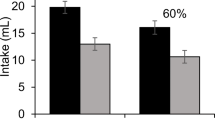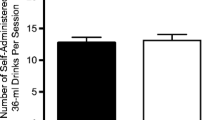Abstract
It has been suggested that liking for the taste, flavour and aroma of, for example, coffee and tea is acquired through the process of classical conditioning, involving association of these orosensory cues with the psychopharmacological consequences of caffeine ingestion. Accordingly, this study investigated caffeine reinforcement by assessing changes in preference for a novel drink consumed with or without caffeine. Particular care was taken to use “ecologically valid” procedures; that is, overnight caffeine abstinence followed by a cup-of-coffee equivalent dose of caffeine (70 mg) at breakfast. Caffeine had no significant effects on drink preference or mood in subjects with habitually low intakes of caffeine. In contrast, moderate users of caffeine developed a relative dislike for the drink lacking caffeine and showed somewhat lowered mood following overnight caffeine abstinence (e.g., less lively, clearheaded and cheerful), which was significantly improved by caffeine. These together with other recent results strongly suggest that, in everyday life, caffeine reinforcement can occur as the result of the alleviation by caffeine of the adverse effects of overnight caffeine abstinence (negative reinforcement). They also demonstrate the utility of this flavour-conditioning procedure, which could be applied in the wider investigation of the reinforcing properties of drugs.
Similar content being viewed by others
References
Birch LL, McPhee L, Steinberg L, Sullivan S (1990) Conditioned flavour preferences in young children. Physiol Behav 47:501–505
Booth DA, French JA, Wainwright CJ, Gatherer AJH (1992) Personal benefits from post-ingestional actions of dietary constituents. Proc Nutr Soc 51:335–341
Bruce M, Scott N, Shine P, Lader M (1991) Caffeine withdrawal: a contrast of withdrawal symptoms in normal subjects who have abstained from caffeine for 24 hours and for 7 days. J Psychopharmacol 5:129–134
Carlson NR (1992) Foundations of physiological psychology, 2nd edn. Allyn and Bacon, Boston
Cines BM, Rozin P (1982) Some aspects of liking for hot coffee and coffee flavour. Appetite 3:23–34
Evans SM, Griffiths RR (1992) Caffeine tolerance and choice in humans. Psychopharmacology 108:51–59
Gilbert RM (1984) Caffeine consumption. In: Spiller GA (ed) The methylxanthine beverages and foods: chemistry, consumption and health. Alan R. Liss, New York, pp 185–214
Goldstein A, Kalant H (1990) Drug policy: striking the right balance. Science 249:1513–1521
Griffiths RR, Woodson PP (1988a) Caffeine physical dependence: a review of human and laboratory animal studies. Psychopharmacology 94:437–451
Griffiths RR, Woodson PP (1988b) Reinforcing effects of caffeine in humans. J Pharmacol Exp Ther 246:21–29
Griffiths RR, Woodson PP (1988c) Reinforcing properties of caffeine: studies in humans and laboratory animals. Pharmacol Biochem Behav 29:419–427
Griffiths RR, Bigelow GE, Liebson IA (1986) Human coffee drinking: reinforcing and physical dependence producing effects. J Pharmacol Exp Ther 239:416–425
Griffiths RR, Bigelow GE, Liebson IA (1989) Reinforcing effects of caffeine in coffee and capsules. J Exp Anal Behav 52:127–140
Hughes JR, Oliveto AH, Helzer JE, Higgins ST, Bickel WK (1992) Should caffeine abuse, dependence, or withdrawal be added to DSM-IV and ICD-10? Am J Psychiatry 149:33–40
Hughes JR, Higgins ST, Bickel WK, Hunt WK, Fenwick JW, Gulliver SB, Mireault GC (1991) Caffeine self-administration, withdrawal, and adverse effects among coffee drinkers. Arch Gen Psychiatry 48:611–617
James JE (1991) Caffeine and health. Academic Press, London
Kuznicki JT, Turner LS (1986) The effects of caffeine on caffeine users and non-users. Physiol Behav 37:397–408
Lorr M, McNair DM (1988) Profile of mood states bi-polar form. Educational and Industrial Testing Service, San Diego
Oliveto AH, Hughes JR, Higgins ST, Bickel WK, Pepper SL, Shea PJ, Fenwick JW (1992) Forced-choice versus free-choice procedures: caffeine self-administration in humans. Psychopharmacology 109:85–91
Richardson NJ, Rogers PJ, Elliman NA, O'Dell RJ (1995) Mood and performance effects of caffeine in relation to acute and chronic caffeine deprivation. Pharmacol Biochem Behav (in press)
Rogers PJ, Blundell JE (1989) Separating the actions of sweetness and calories: effects of saccharin and carbohydrates on hunger and food intake in human subjects. Physiol Behav 45:1093–1099
Rogers PJ, Lloyd HM (1994) Nutrition and mental performance. Proc Nutr Soc 53:443–456
Rogers PJ, Richardson NJ (1993) Why do we like drinks that contain caffeine? Trends Food Sci Technol 4:108–111
Rogers PJ, Richardson NJ, Dernoncourt C (1995) Caffeine use: is there a net benefit for mood and psychomotor performance? Neuropsychobiology 31:195–199
Silverman K, Evans SM, Strain EC, Griffiths RR (1992a) Withdrawal syndrome after the double-blind cessation of caffeine consumption. N Engl J Med 327:1109–1114
Silverman K, Mumford GK, Griffiths RR (1994) Enhancing caffeine reinforcement by behavioral requirements following drug ingestion. Psychopharmacology 114:424–432
Smith AP, Rusted JM, Savory M, Eaton-Williams P, Hall SR (1991) The effects of caffeine, impulsivity and time of day on performance, mood and cardiovascular function. J Psychopharmacol 5:120–128
Stern KN, Chait LD, Johanson CE (1989) Reinforcing effects of caffeine in normal human volunteers. Psychopharmacology 98:81–88
Thayer RE (1989) The biopsychology of mood and arousal. Oxford University Press, New York
Van Dusseldorp M, Katan MB (1990) Headache caused by caffeine withdrawal among moderate coffee drinkers switched from ordinary to decaffeinated coffee: a 12-week double-blind trial. BMJ 300:1558–1559
Vitiello MV, Woods SC (1977) Evidence for withdrawal from caffeine in rats. Pharmacol Biochem Behav 6:553–555
Zellner DA (1991) How foods get to be liked: some general mechanisms and some special cases. In: Bolles RC (ed) The hedonics of taste. Lawrence Erlbaum Associates, Hillside New Jersey, pp 199–217
Author information
Authors and Affiliations
Rights and permissions
About this article
Cite this article
Rogers, P.J., Richardson, N.J. & Elliman, N.A. Overnight caffeine abstinence and negative reinforcement of preference for caffeine-containing drinks. Psychopharmacology 120, 457–462 (1995). https://doi.org/10.1007/BF02245818
Received:
Revised:
Issue Date:
DOI: https://doi.org/10.1007/BF02245818




